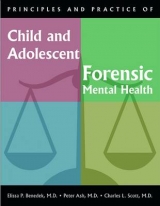
Principles and Practice of Child and Adolescent Forensic Psychiatry
American Psychiatric Press Inc. (Verlag)
978-0-88048-956-0 (ISBN)
- Titel erscheint in neuer Auflage
- Artikel merken
It was not until the mid-twentieth century that childhood achieved recognition as a developmental stage separate from adulthood. Despite the legal protections (e.g., child labor laws) for children that have been established since then, we're still relatively early in the process of discovering childhood's legal and forensic contexts. Taking us a quantum leap forward is this practical textbook, a step-by-step guide that walks clinicians through the often-confusing world of depositions and courtroom testimony. The editorsApioneers in child and adolescent forensic psychiatryAhave dramatically expanded their earlier textbook (Clinical Handbook of Child Psychiatry and the Law), bringing clarity and coherence to these complex and often highly charged clinical and legal issues by emphasizing evidence-based research within an easy-to-read outline format.
Structured around clinical case examples, countertransference pitfalls, and guidelines for action, -Part 1, Basics reviews the history and principles of law (forensic ethics, psychological testing, and testifying in court) of forensic psychiatry and provides a framework for approaching forensic evaluations (including vicarious traumatization). -Part II, Child Custody talks about how to approach child custody disputes (including current social dilemmas that pose ethical and clinical questions for the forensic examiner), evaluations and assessments, foster care and adoption, termination of parental rights, and transracial/transcultural adoption in the United States. -Part III, Child Abuse presents new information on the developmental aspects of memory in children, the reliability and suggestibility of children's statements, interview techniques, Munchausen syndrome by proxy, sexual harassment in school-age children, and child pornography.
-Part IV, Youth Violence details how violence affects the child's developing brain (setting the stage for conduct disorders, dissociative disorders, and posttraumatic stress disorder), assesses the risks of carrying weapons, and summarizes youth risk factors, common evaluation pitfalls, and prevention and intervention programs. -Part V, Juvenile Offenders highlights the differences between the content and application of juvenile and adult law, addressing the waiver of juveniles to adult court, effective early detection and intervention programs, and techniques for helping the especially problematic sexually aggressive youth. -Part VI, Legal Issues reviews the treatment of minors, the current state (including recent court decisions) of psychiatric commitment of minors, special issues for mentally retarded children, and psychic trauma and civil litigation. Even clinicians who plan never to set foot in court will want to have this reference on hand.
Rich in both historical detail and practical guidance, this remarkable collection by top authors and clinicians in the field is the definitive reference (and preparation guide for board certification in forensic psychiatry) for practitioners, forensic examiners, attorneys and judges, and trainees in child and adolescent psychiatry and psychology.
Elissa P. Benedek, M.D., is Clinical Professor of Psychiatry at the University of Michigan Medical Center in Ann Arbor, Michigan. Diane H. Schetky, M.D., is in the private practice of forensic psychiatry in Rockport, Maine. She is also Clinical Professor of Psychiatry at the University of Vermont College of Medicine at Maine Medical Center in Portland, Maine.
Contributors. Foreword: A voyage of discovery. Preface. Part I: Basics. History of child and adolescent forensic psychiatry. Introduction to the legal system. Forensic ethics. Introduction to forensic evaluations. Testifying: the expert witness in court. Psychological testing in child and adolescent forensic evaluations. Vicarious traumatization. Part II: Child Custody. Child custody evaluations. Parenting assessment in cases of neglect and abuse. Foster care and adoption. Termination of parental rights. Transracial and transcultural adoption in the United States. Part III: Child Abuse. Developmental aspects of memory in children. Reliability and suggestibility of children's statements: from science to practice. Interviewing children for suspected sexual abuse. Forensic issues in Munchausen by Proxy. Clinical and forensic aspects of sexual harassment in school-age children. Children and pornography: old problems, new technology. Part IV: Youth Violence. Neurodevelopmental impact of violence in childhood. Domestic abuse as a risk factor for children and youth. Effects of witnessing violence on children and adolescents. Children's access to weapons. Risk assessment of violence in youths. Prevention of youth violence. Part V: Juvenile Offenders. Overview of juvenile law. Assessment and treatment of juvenile offenders. Sexually aggressive youth. Juvenile waivers to adult court. State of mind assessments and competency/criminal responsibility. Part VI: Legal Issues. Legal issues in the treatment of minors. Psychiatric commitment of children and adolescents. Legal aspects of mental retardation. Psychic trauma and civil litigation. Forensic telepsychiatry. Index.
| Erscheint lt. Verlag | 30.1.2002 |
|---|---|
| Zusatzinfo | index |
| Verlagsort | VA |
| Sprache | englisch |
| Maße | 222 x 286 mm |
| Gewicht | 1315 g |
| Themenwelt | Geisteswissenschaften ► Psychologie |
| Medizin / Pharmazie ► Medizinische Fachgebiete ► Psychiatrie / Psychotherapie | |
| Sozialwissenschaften ► Soziologie | |
| ISBN-10 | 0-88048-956-1 / 0880489561 |
| ISBN-13 | 978-0-88048-956-0 / 9780880489560 |
| Zustand | Neuware |
| Haben Sie eine Frage zum Produkt? |
aus dem Bereich



